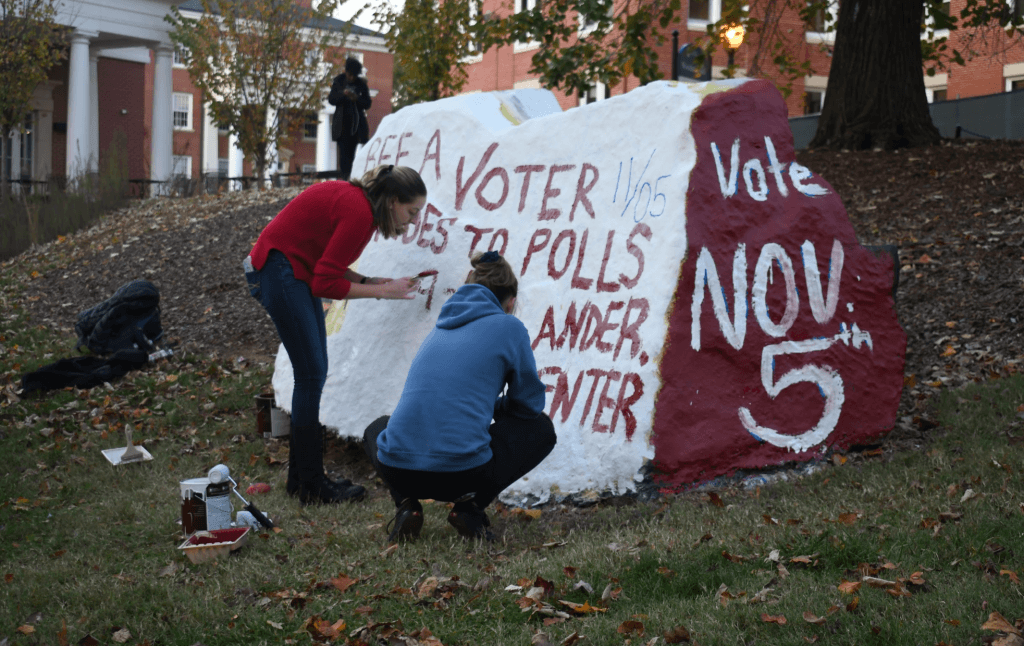Student political groups organize voter turnout events for the November 5 election
4 min read
Students from political groups on campus paint the Spirit Rock to advertise for rides to the polls. (Jey Lewis | The Blue & Gray Press)
by KATIA SAVELYEVA
Staff Writer
On Tuesday, Nov. 5, a narrowly Republican-controlled Virginia legislature was overturned by the Democrats in both houses. This marks the first time since 1994 that the legislature has been under Democratic control.
In the Senate seats local to Fredericksburg, Richard Stuart, the 28th District’s Republican incumbent, defeated Democrat Qasim Rashid, collecting 58 percent of the vote. Republican incumbent Bryce Reeves also kept his seat, defeating Amy Laufer with 52 percent of the vote.
As for the House of Delegates, Republican Mark Cole of District 88 collected 55 percent of the vote, defeating challenger Jessica Foster.
However, Democrat Joshua Cole defeated Republican Paul Milde, collecting 52 percent of the vote for District 28. The two were competing for the seat of incumbent Republican Robert Thomas, who lost the Republican primary to Milde earlier this year.
The Virginia legislative race was closely watched this year due to the fact that whichever party won control of the legislature would then control redistricting following the 2020 census. The Democrats now have the ability to redraw districts that have been criticized for being heavily gerrymandered in favor of Republicans.
“The big question is: will Virginia Democrats continue to back independent redistricting now that they have obtained the power to do to Republicans what Republicans have done to them?” said UMW political science professor Stephen Farnsworth.
In addition to redistricting, a Democratically-controlled legislature will create a different policy conversation in the upcoming General Assembly session. However, Farnsworth stressed the importance of not overstating the radicalism of the upcoming legislature.
“Many Democrats remain moderate in their politics,” said Farnsworth. “Tuesday’s results will not make Virginia an East Coast version of California.”
All the same, many new policy possibilities have opened up as a result of the flip. Farnsworth mentioned gun control issues, raising the minimum wage and passing the Equal Rights Amendment as a few likely avenues for Democratic focus and success. Additionally, education and environmental regulation are likely to gain greater focus.
The new policy possibilities are intimidating to some. “I feel that being a young Republican at this time is frustrating,” said Rachel Hodges, president of UMW College Republicans. “I watch so many young people support extreme legislation.”
Others are excited for the potential changes. “I’m very excited about the future of Virginia politics,” said Sam Hartz, president of UMW Young Democrats. “It was also great to see all the UMW students who took the time to vote, and it made a real difference with Josh Cole being elected to represent most of campus in the House of Delegates.”
As a whole, UMW’s student body has been strongly involved with the Fredericksburg races.
“We’ve been knocking on doors, phone-banking, organizing and doing whatever we can to support the great candidates that the Democratic party has running this year,” said Hartz about the Young Democrats.
Similar efforts have been made by the College Republicans. “UMW College Republicans have spent months door-knocking, making phone calls, and sending texts for not only our local candidates but candidates all around Virginia,” said Hodges.
In addition, these two political student clubs have co-hosted debates between local candidates and made an effort to introduce these candidates to their members.
The campus organization UMW Votes collaborated with other students and organizations to coordinate rides to the polls. The group drove a total of 161 students to the polls over the course of Election Day.
“Seeing that we’ve managed to produce results and get the word out about this election and who’s running is beyond me. I’m incredibly proud to be a member,” said UMW Votes member and sophomore communication and digital studies major Amber Brown.
Students who used UMW Votes’ resources on campus were confident in the importance of their participation.
“I really like how UMW is encouraging people to vote, because that’s how we as a society can have a say in what happens,” said freshman Erin Mahoney, who aided the effort to get students to the polls as a campus organizer for Feminist Majority. “We’ll have setbacks, that’s kind of a given, but if we’re resilient we can get past that.”
“Everyone’s opinion matters. Their voice matters,” said freshman Karlie Jahn. “We have to be able to push ourselves to try and explore options and different candidates.”
Sophomore computer science major Jane Hill said, “I like having civil rights. I like the people that I care about being able to exist as people without being systemically discriminated against. So voting is a way to try to make things better.”
In Hartz’s experience, the political atmosphere of the last few years has been conducive to youth participation.
“The first election that I was able to participate in ended with Donald Trump being elected president and that was a moment that I think really galvanized people on both sides to get more involved,” said Hartz. “It’s a whirlwind. There’s so much excitement and energy around politics and being a part of real political change that it’s hard not to want to be a part of it.”



1 thought on “Student political groups organize voter turnout events for the November 5 election”
Comments are closed.